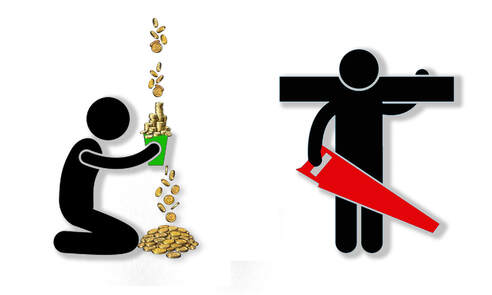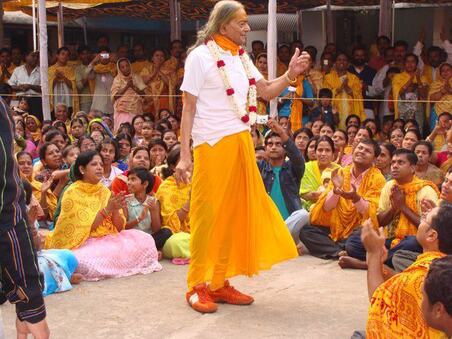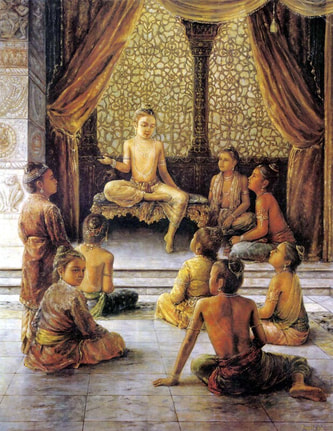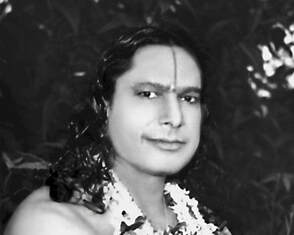 When education, wealth and profession are predestined why labor?
When education, wealth and profession are predestined why labor?
Question:
When education, profession and wealth are all predestined then why should one work hard through school, make efforts to find a good job or even save for retirement? One should just wait for things to happen by themselves, as everything is predestined.
Answer:
All human beings are endowed with an internal machinery, called antahkaran (अन्तःकरण). Antah(अन्तः) means internal and karan (करण) means machinery. This machinery performs three kinds of actions: thinking, deciding and desiring.
Depending on the kind of action performed, it is called one of four things: man, buddhi, chitta or ahankaar
Mind is the doer. It remains in a constant state of activity and does not stay inert even for a fraction of a second. It works even while the body is at rest during sleep. The only time it rests is when one is in the state of deep-sleep (dreamless state) or shushupti (सुषुप्ति).
The actions performed by the mind may involve:
As per the spiritual law, every action (karma) results in an outcome. The karma are divided into three categories. The actions performed, using our rational faculty, are called kriyamaan karma (क्रियमाण कर्म). Even though the result of each action is decided as soon as the action is performed, yet out of His kind mercy, God makes us bear the fruits of only some of those actions instantaneously for e.g. when we eat food, we feel full, when we drink water, our thirst is quenched. For all other actions, we do not have to bear the fruits of those actions instantaneously. These fruits are preserved in the subtle mind and have to be borne in multiple future lifetimes. These countless actions are called sanchit karma (संचित कर्म) or preserved-actions. From the karmas performed in previous lifetimes, God selects a few karmas for which one has to bear the fruits in this lifetime. Those select few karmas are called prarabdh karma (प्रारब्ध कर्म), also known as destiny, fate, bhagya (भाग्य), kismat (किस्मत), niyati (नियति) etc.
Everyone has to endure prarabdha karma (fate). In everyone's life there are five principal predestined aspects i.e. age, profession, wealth, education and time of death.
When education, profession and wealth are all predestined then why should one work hard through school, make efforts to find a good job or even save for retirement? One should just wait for things to happen by themselves, as everything is predestined.
Answer:
All human beings are endowed with an internal machinery, called antahkaran (अन्तःकरण). Antah(अन्तः) means internal and karan (करण) means machinery. This machinery performs three kinds of actions: thinking, deciding and desiring.
Depending on the kind of action performed, it is called one of four things: man, buddhi, chitta or ahankaar
- Man (मन) - when it creates a desire for something, it is called the mind or man
- Buddhi (बुद्धि) - when it takes a decision, it is called intellect or buddhi
- Chitta (चित्त) - when it thinks and deliberates, it is called chitta
- Ahankaar (अहंकार) - when it gives rise to pride or ego, it is called ego or ahankaar
Mind is the doer. It remains in a constant state of activity and does not stay inert even for a fraction of a second. It works even while the body is at rest during sleep. The only time it rests is when one is in the state of deep-sleep (dreamless state) or shushupti (सुषुप्ति).
The actions performed by the mind may involve:
- The mind alone - when only the mind is at work, while the body is at rest e.g. while dreaming in the state of sleep.
- The mind along-with the physical body - both the mind and the body are involved and the mind is fully engaged and enjoying the physical activity e.g. a mother lovingly cooking food for her child.
- The physical body alone - both the body and the mind are involved but the mind does not derive any pleasure in the physical activity e.g. most people work in the office to earn a paycheck but don’t necessarily derive much pleasure from going to work.
As per the spiritual law, every action (karma) results in an outcome. The karma are divided into three categories. The actions performed, using our rational faculty, are called kriyamaan karma (क्रियमाण कर्म). Even though the result of each action is decided as soon as the action is performed, yet out of His kind mercy, God makes us bear the fruits of only some of those actions instantaneously for e.g. when we eat food, we feel full, when we drink water, our thirst is quenched. For all other actions, we do not have to bear the fruits of those actions instantaneously. These fruits are preserved in the subtle mind and have to be borne in multiple future lifetimes. These countless actions are called sanchit karma (संचित कर्म) or preserved-actions. From the karmas performed in previous lifetimes, God selects a few karmas for which one has to bear the fruits in this lifetime. Those select few karmas are called prarabdh karma (प्रारब्ध कर्म), also known as destiny, fate, bhagya (भाग्य), kismat (किस्मत), niyati (नियति) etc.
Everyone has to endure prarabdha karma (fate). In everyone's life there are five principal predestined aspects i.e. age, profession, wealth, education and time of death.
|
So, the question arises, when we have to undergo the predestined fruits of previous actions, then why are we advised to perform good deeds?
That is because not everything in life is predestined. These five outcomes are predestined. The rest of the outcomes in the present and future lives depend on one’s kriyamaan karma in the current lifetime. By the grace of God, life runs smoothly, except when having to endure a few occasional problems. It is written in Shrimad Bhagvatam that saint Prahlad, who was born in a demon family, addressed his fellow demon classmates and said: सुखमैन्द्रियकं दैत्या देहयोगेन देहिनाम्।
सर्वत्र लभ्यते दैवात् यथा दु:खमयत्नतः ॥ भा ७.६.३ sukhamaindriyakaṃ daityā dehayogena dehinām। sarvatra labhyate daivāt।yathā du:khamayatnataḥ ॥ bhā 7.6. |
“O sons of the demons! Just as the sufferings inevitably befall (without any effort) upon us, similarly everyone attains sense gratification as per their destiny”.
We are rarely grateful to God in good times, but accuse Him or curse our ill-fate in difficult times. As Saint Kabir Das says:
|
दुख में सुमिरन सब करे, सुख में करै न कोइ ।
जो सुख में सुमिरन करे, तो दुख काहे को होइ ॥ dukha meṃ sumirana saba karaiṃ, sukha meṃ kare na koi । jo sukha meṃ sumirana kare to dukha kāhe ko hoi ॥ "Everyone calls out to God in the times of misery, but not otherwise. If one were to call out to Him in happy times then why will misery come?" Instead of accusing God or cursing one's fate, one needs to develop feelings of gratitude and strive to perform good deeds which would yield good results for a bright future.
Lord Krishna says: |
कर्मणां संचितादीनां जीवोऽधीनस्तथापि हि । स्वतंत्रः क्रियमाणे वै कृतो भगवता विदा ॥
karmaṇāṃ saṃcitādīnāṃ jīvo'dhīnastathāpi hi । svataṃtraḥ kriyamāṇe vai kṛto bhagavatā vidā ॥
karmaṇāṃ saṃcitādīnāṃ jīvo'dhīnastathāpi hi । svataṃtraḥ kriyamāṇe vai kṛto bhagavatā vidā ॥
 By the association of a true saint, the individual soul becomes familiar with those actions which lead to a happy and ideal future
By the association of a true saint, the individual soul becomes familiar with those actions which lead to a happy and ideal future
“Though living beings are constrained by their sanchit karmas, yet they are free to perform good or bad kriyamaan karmas”.
Given our freewill, we have the freedom to perform actions. Also, every action results in an outcome. Since we want to attain an ideal life, a logical deduction would be that we need to perform ideal actions. Following the advice of ignorant beings cannot lead us towards making wise decisions. That’s why satsang - association with a true saint (see Saint or Imposter) - is so important. By the association of a true saint, the individual soul becomes familiar with those actions which lead to a happy and ideal future (see Aim of Life).
All the karmas are driven by one of the three guna of Maya. So they can be classified into three kinds:
1. Sattvik - virtuous actions. These are also called good actions. Honesty, purity, kindness, sympathy, compassion etc.are considered as virtues. Actions inspired by these virtues are called sattvik karm and lead towards celestial abodes. In those abodes one is provided with great sensual pleasures. However, sense gratification in these abodes is limited and short-lived. One can enjoy the luxuries of heavenly planets only as long as the fruits of one's predestined virtuous actions exist. When these are exhausted then one falls into the cycle of birth and death.
The Gita says:
Given our freewill, we have the freedom to perform actions. Also, every action results in an outcome. Since we want to attain an ideal life, a logical deduction would be that we need to perform ideal actions. Following the advice of ignorant beings cannot lead us towards making wise decisions. That’s why satsang - association with a true saint (see Saint or Imposter) - is so important. By the association of a true saint, the individual soul becomes familiar with those actions which lead to a happy and ideal future (see Aim of Life).
All the karmas are driven by one of the three guna of Maya. So they can be classified into three kinds:
1. Sattvik - virtuous actions. These are also called good actions. Honesty, purity, kindness, sympathy, compassion etc.are considered as virtues. Actions inspired by these virtues are called sattvik karm and lead towards celestial abodes. In those abodes one is provided with great sensual pleasures. However, sense gratification in these abodes is limited and short-lived. One can enjoy the luxuries of heavenly planets only as long as the fruits of one's predestined virtuous actions exist. When these are exhausted then one falls into the cycle of birth and death.
The Gita says:
ते तं भुक्त्वा स्वर्गलोकं विशालं, क्षीणे पुण्ये मर्त्यलोकं विशन्ति ॥
te taṃ bhuktvā svargalokaṃ viśālaṃ, kṣīṇe puṇye martyalokaṃ viśanti ॥
te taṃ bhuktvā svargalokaṃ viśālaṃ, kṣīṇe puṇye martyalokaṃ viśanti ॥
“After enjoying all the fruits of virtuous actions one has to come back on earth in the lower forms of life (e.g. dog cat or even lower)”.
So, if one aims to attain the permanent and ever-lasting happiness then sattvic karm are not recommended.
2. Rajas - selfish actions - that can best be explained as somewhere in between good and bad. These actions are inspired by selfish motives. These actions result in an individual soul roaming in the cycle of birth and death in various forms of life.
3. Tamas - bad actions - the bad attributes of dishonesty, anger, passion, greed, lust etc. which lead us towards sufferings are called tamas. The result of these actions is to undergo sufferings of narak for an unpredictable amount of time.
Thus according to the theory of karma, no good or bad actions are capable of permanently delivering us from our sufferings.
At this point, you might wonder “We have been born in a human form. Is there no action,that can deliver us from the miseries of life forever?” Yes, there are! To learn about such actions we need the association of a true saint, who has already attained that everlasting, unlimited bliss.
The rarest of rare human form is not meant only to undergo the results of our good and bad deeds. We have been given free-will and as a rational being we are expected to progress towards the ultimate goal of life.
- Human form is THE ONLY form where we can perform fruit-yielding actions.
- We have no clue of what is predestined and what is not. In the absence of that knowledge we should strive to do our personal best. If it is not destined, we won’t get it.
उद्योगिनं पुरुषसिंहमुपैति लक्ष्मीर्दैनेन देयमिति कापुरुषा वदन्ति ।
दैवं निहत्य कुरु पौरुषामात्मशक्त्या, यत्ने कृते यदि न सिध्यति कोऽत्र दोषः ॥
udyoginaṃ puruṣasiṃhamupaiti lakṣmīrdainena deyamiti kāpuruṣā vadanti ।
daivaṃ nihatya kuru pauruṣāmātmaśaktyā, yatne kṛte yadi na sidhyati ko'tra doṣaḥ ॥
दैवं निहत्य कुरु पौरुषामात्मशक्त्या, यत्ने कृते यदि न सिध्यति कोऽत्र दोषः ॥
udyoginaṃ puruṣasiṃhamupaiti lakṣmīrdainena deyamiti kāpuruṣā vadanti ।
daivaṃ nihatya kuru pauruṣāmātmaśaktyā, yatne kṛte yadi na sidhyati ko'tra doṣaḥ ॥
“A wise person does not sit idle relying solely on fate. He diligently works towards his goals with a firm knowledge that exerting effort is within my control; attaining a desirable result is not. So, in case, he does not get the desired results he will be certain that it wasn’t due to the lack of effort but because it was not destined for him”.
Never think ‘’everything would fall in my lap without exerting any effort’’. Suppose, you are destined to be rich. You will attain a lot of wealth in accordance with your virtuous karma. Also, that wealth might last for the whole lifetime or not. If you are not industrious, what will you do when you aren’t destined to be rich? Further, money alone does not provide everything needed for a fulfilling life. You need many other things in life, which may or may not be predestined e.g. attaining unsurpassed bliss. What will you do for those needs of life? So, being a diligent-worker with a positive mindset is very important.
That is the main purpose behind performing well-intentioned good actions.
Never think ‘’everything would fall in my lap without exerting any effort’’. Suppose, you are destined to be rich. You will attain a lot of wealth in accordance with your virtuous karma. Also, that wealth might last for the whole lifetime or not. If you are not industrious, what will you do when you aren’t destined to be rich? Further, money alone does not provide everything needed for a fulfilling life. You need many other things in life, which may or may not be predestined e.g. attaining unsurpassed bliss. What will you do for those needs of life? So, being a diligent-worker with a positive mindset is very important.
That is the main purpose behind performing well-intentioned good actions.
Love our Publications!!
Give a gift of love to a dear one!
Forward this article to a loved one and ask them to subscribe to receive more such article in the inbox once a month.
|
To receive this publication monthly please subscribe by entering the information below
|





